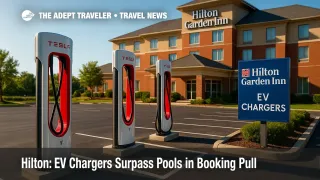Hilton: EV Chargers Surpass Pools in Booking Pull

Hilton guests have a new must-have amenity. The company says rooms showing on-site electric-vehicle chargers now convert into bookings more often than listings touting classic draws such as swimming pools, free breakfast, or on-property restaurants. The shift comes as Hilton accelerates its 2023 Tesla partnership, which aims to build the largest hotel-based charging network in North America with 20 000 units across 2 000 properties. Competitors are racing to catch up, but Hilton's early data suggests chargers are already a powerful revenue lever.
Key Points
- Why it matters: EV owners are an affluent, fast-growing segment, and charger availability is now the top Hilton.com conversion driver.
- Roll-out: Up to 20 000 Tesla Universal Wall Connectors at 2 000 North American hotels by late 2025.
- Uptake: About 25 percent of U.S. hotels now offer charging; Marriott reports 7 000 plugs worldwide.
- Guest profile: EV drivers typically earn over $100 000 and book longer stays.
- Sustainability: Chargers support Hilton's 2030 "Travel with Purpose" emissions targets.
Snapshot
Electric-vehicle charging stations have vaulted from "nice to have" to Hilton's single most influential amenity for converting website lookers into bookers. Internal analytics shared with industry media show listings flagged with EV chargers outperform those featuring pools, restaurants, or complimentary breakfast. The surge in demand follows a North American EV fleet that topped three million vehicles in early 2025 and record summer road-trip travel. Hilton currently offers plugs at more than 1 400 hotels and plans thousands more. Competitors-including Marriott, Hyatt, and Accor-have announced parallel expansions, but Hilton's tie-up with Tesla positions it to claim the category's scale advantage.
Background
Hilton's charger push began in September 2023, when it agreed with Tesla to install at least six Universal Wall Connectors at 2 000 hotels across the U.S., Canada, and Mexico. The deal promised the hospitality sector's largest overnight charging network and dovetailed with Hilton's broader Travel with Purpose agenda to cut Scope 1 and 2 emissions in half by 2030. Early installations rolled out in early 2024, targeting interstate corridors and high-demand urban markets. Parallel studies by Airbnb and the American Hotel & Lodging Association have since shown that listings with EV charging generate longer stays and higher nightly revenue, reinforcing the business case for hotel chains. Pools and complimentary breakfast, once universal booking hooks, now lag behind charging in search-filter popularity.
Latest Developments
In-house analytics tip the scales
Hilton's sustainability chief, Jean Garris Hand, told industry outlet Skift that charger-equipped hotels currently top all other amenity filters for turning shopper interest into completed reservations. Properties without pools but with chargers are seeing ready demand, particularly in suburban and interstate locations where public fast-charging remains patchy.
Roll-out accelerates after pilot success
With roughly 15 percent of the planned 20 000 Tesla units live, Hilton says deployment teams will finish the balance by year-end 2025. Installations focus on Garden Inn, Hampton, and Embassy Suites brands, where road-trippers dominate the guest mix. The universal hardware supports any North American EV model, widening appeal beyond Tesla drivers.
Competitive landscape widens
Marriott now advertises more than 7 000 chargers worldwide, Radisson is trialing 175-kW ultra-fast units in Europe, and Accor's Novotel brand bundles charging into corporate contracts. Analysts predict that by 2027, a majority of upper-midscale U.S. hotels will offer at least Level 2 charging as standard equipment, mirroring today's expectation for Wi-Fi.
Analysis
Hilton's data point is an inflection for hotel revenue management. Amenities traditionally viewed as discretionary capex-pools, spas, breakfast buffets-are no longer the prime catalysts for conversion. Instead, EV infrastructure, often subsidized by hardware partners and tax incentives, yields a clearer ROI through higher booking velocity and longer average length of stay. The finding also underscores a demographic shift: EV adoption skews toward higher-income travelers who value sustainability and are willing to pay premium nightly rates for plug-in convenience. Hilton's early mover status grants pricing power and loyalty-program differentiation, but the advantage may erode as competitors close the charger gap. Longer-term, widespread hotel charging could accelerate EV road-trip adoption, redistribute demand from city centers to highway exits, and pressure lagging properties to retrofit parking lots. Brands that integrate charging data into search filters, loyalty perks, and dynamic pricing will capture upside as hardware becomes table stakes.
Final Thoughts
Hilton's revelation that EV chargers now trump pools and free breakfast in booking conversion signals a pivotal realignment of guest priorities. Hotels that scale reliable, universal charging quickly stand to win share among affluent, eco-minded travelers-and set new performance benchmarks for the industry. Expect charger counts, not cabana counts, to dominate amenity wars in the seasons ahead as the hospitality sector plugs into the electric future on Hilton's terms around Hilton EV chargers.
